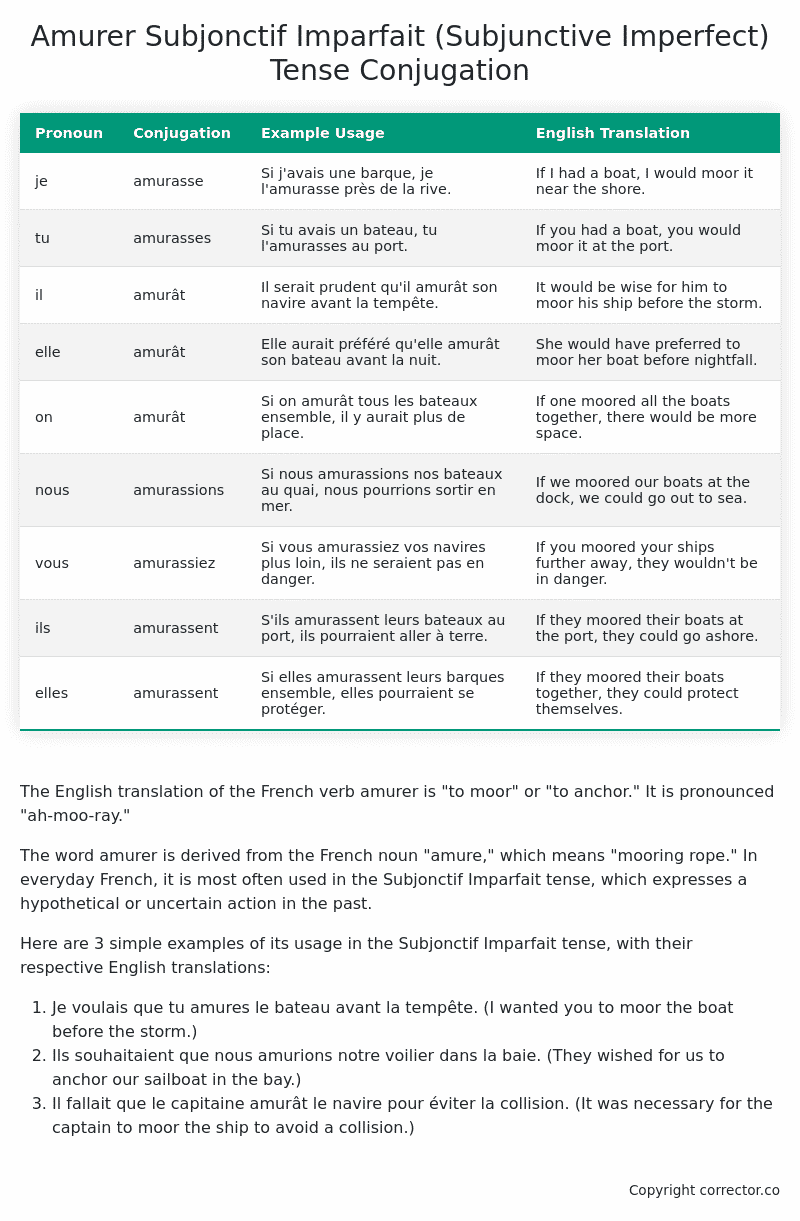Subjonctif Imparfait (Subjunctive Imperfect) Tense Conjugation of the French Verb amurer
Introduction to the verb amurer
The English translation of the French verb amurer is “to moor” or “to anchor.” It is pronounced “ah-moo-ray.”
The word amurer is derived from the French noun “amure,” which means “mooring rope.” In everyday French, it is most often used in the Subjonctif Imparfait tense, which expresses a hypothetical or uncertain action in the past.
Here are 3 simple examples of its usage in the Subjonctif Imparfait tense, with their respective English translations:
- Je voulais que tu amures le bateau avant la tempête. (I wanted you to moor the boat before the storm.)
- Ils souhaitaient que nous amurions notre voilier dans la baie. (They wished for us to anchor our sailboat in the bay.)
- Il fallait que le capitaine amurât le navire pour éviter la collision. (It was necessary for the captain to moor the ship to avoid a collision.)
Table of the Subjonctif Imparfait (Subjunctive Imperfect) Tense Conjugation of amurer
| Pronoun | Conjugation | Example Usage | English Translation |
|---|---|---|---|
| je | amurasse | Si j’avais une barque, je l’amurasse près de la rive. | If I had a boat, I would moor it near the shore. |
| tu | amurasses | Si tu avais un bateau, tu l’amurasses au port. | If you had a boat, you would moor it at the port. |
| il | amurât | Il serait prudent qu’il amurât son navire avant la tempête. | It would be wise for him to moor his ship before the storm. |
| elle | amurât | Elle aurait préféré qu’elle amurât son bateau avant la nuit. | She would have preferred to moor her boat before nightfall. |
| on | amurât | Si on amurât tous les bateaux ensemble, il y aurait plus de place. | If one moored all the boats together, there would be more space. |
| nous | amurassions | Si nous amurassions nos bateaux au quai, nous pourrions sortir en mer. | If we moored our boats at the dock, we could go out to sea. |
| vous | amurassiez | Si vous amurassiez vos navires plus loin, ils ne seraient pas en danger. | If you moored your ships further away, they wouldn’t be in danger. |
| ils | amurassent | S’ils amurassent leurs bateaux au port, ils pourraient aller à terre. | If they moored their boats at the port, they could go ashore. |
| elles | amurassent | Si elles amurassent leurs barques ensemble, elles pourraient se protéger. | If they moored their boats together, they could protect themselves. |
Other Conjugations for Amurer.
Le Present (Present Tense) Conjugation of the French Verb amurer
Imparfait (Imperfect) Tense Conjugation of the French Verb amurer
Passé Simple (Simple Past) Tense Conjugation of the French Verb amurer
Passé Composé (Present Perfect) Tense Conjugation of the French Verb amurer
Futur Simple (Simple Future) Tense Conjugation of the French Verb amurer
Futur Proche (Near Future) Tense Conjugation of the French Verb amurer
Plus-que-parfait (Pluperfect) Tense Conjugation of the French Verb amurer
Passé Antérieur (Past Anterior) Tense Conjugation of the French Verb amurer
Futur Antérieur (Future Anterior) Tense Conjugation of the French Verb amurer
Subjonctif Présent (Subjunctive Present) Tense Conjugation of the French Verb amurer
Subjonctif Passé (Subjunctive Past) Tense Conjugation of the French Verb amurer
Subjonctif Imparfait (Subjunctive Imperfect) Tense Conjugation of the French Verb amurer (this article)
Subjonctif Plus-que-parfait (Subjunctive Pluperfect) Tense Conjugation of the French Verb amurer
Conditionnel Présent (Conditional Present) Tense Conjugation of the French Verb amurer
Conditionnel Passé (Conditional Past) Tense Conjugation of the French Verb amurer
L’impératif Présent (Imperative Present) Tense Conjugation of the French Verb amurer
L’infinitif Présent (Infinitive Present) Tense Conjugation of the French Verb amurer
Struggling with French verbs or the language in general? Why not use our free French Grammar Checker – no registration required!
Get a FREE Download Study Sheet of this Conjugation 🔥
Simply right click the image below, click “save image” and get your free reference for the amurer Subjonctif Imparfait tense conjugation!

Amurer – About the French Subjonctif Imparfait (Subjunctive Imperfect) Tense
Formation
Common Everyday Usage Patterns
Interactions with Other Tenses
Subjonctif Présent
Indicatif Passé Composé
Conditional
Conditional Perfect
Summary
I hope you enjoyed this article on the verb amurer. Still in a learning mood? Check out another TOTALLY random French verb conjugation!


